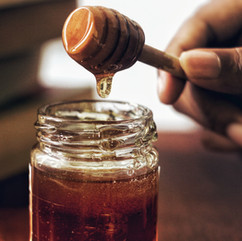The issue with Antibiotics and Natural Alternatives to them.
- becfarah
- Sep 12, 2021
- 8 min read
Updated: Apr 24, 2025
Caught a cold or flu? Antibiotics. Coughing? Antibiotics. Ear infection? Antibiotics.
Sound familiar?
Antibiotics have become one of the most over-prescribed conventional medicines today. Have you ever gone to the doctors when you were unwell and were prescribed antibiotics, despite a lack of diagnosis yet?
Introduced in the 1940’s, antibiotics have been embedded as medicine for the treatment of bacterial infections. Although antibiotics have their place in medicine, are antibiotics really worth the underlying risk?
Know that I have no issue with antibiotics themselves, they are a God-send for saving lives! What I have an issue with, is them being OVER prescribed for conditions that don't require them. They should be left for life-threatening conditions because, like all medication, they put a lot of stress on the body, especially our precious gut.
I've lost count of the number of patient's I've seen when their symptoms began years ago after a course of antibiotics, saying their gut's never been the same since.
The first national report of antimicrobial use found almost half of all Australians were prescribed antibiotics at least once in 2014, and a huge proportion didn't need them.
Australian Commission on Safety and Quality in Health Care report found that in Australia's hospitals on any given day more than one-third of patients were given antibiotics, with almost half either inappropriately prescribed or flouting guidelines. Similarly, more than one-third of people who visit the doctor when they or their child have a cold or flu-like symptoms are expected to be prescribed antibiotics. The highest rates of antibiotics use in the community were among children up to nine years old and people over 65, with medical practitioners accounting for 88% of all antibiotic prescriptions.
Senior medical adviser, Professor John Turnidge, suggests that “it's such an ingrained belief that all infections are caused by bacteria and require antibiotics when in fact most respiratory infections, around 95 per cent, are caused by virus, and in these instances antibiotics give you nothing but side effects”.
So why should you care?
Let's talk about antibiotic resistance
It is important to be aware of the many side effects and consequences with the overuse of antibiotics and broad-spectrum drugs have on our bodies. It can make the drugs less effective against the bacteria they are intended to treat by encouraging the growth of antibiotic-resistant infection. Conventional antibiotics only target the essential growth processes of bacteria, allowing bacteria to build up a resistance over time, whilst simultaneously destroying beneficial gut bacteria. Today, bacteria which are resistant not only to a single drug but simultaneously to many drugs, are rampantly spread in the community and clinically due to the improper use of antibiotics in the past decade. Antibiotic resistance may result in treatment failure, increased treatment costs as well as the rate of fatalities, and creates even broader infection control problems – spreading resistant bacteria from hospital to community.
Antibiotics give rise to opportunistic organisms in the gut
Have you ever gotten thrush after taking a course of antibiotics?
After taking a course of antibiotics, a lot of the friendly bacteria that exist in our digestive system are also killed and this can make room for what we call - opportunistic organisms to grow. This means that normal bacteria, fungi, viruses and parasites that are a healthy and normal part of the ecosystem in the gut, have the opportunity to grow and become pathogenic and cause havoc in the gut – we’ve essentially wiped out the good bacteria that were keeping pathogenic organisms like Candida and parasites in check leading to an overgrowth.
Because they give rise to fungal infections, anti-fungal medication or herbs should be prescribed alongside antibiotics. Saccharomyces Boulardii (yes, why we abbreviate him SB), is a specific strain of probiotic yeast (don't freak out, a great yeast, not dangerous one), that should be taken while on a course of antibiotics to support gut health. With taking any herbal or nutritional supplement, always ask your naturopath before administering for safety and dosages.
Antibiotics damage the lining of the gut causing leaky gut and reduce nutrient absorption. They can also wipe out good bacteria (probiotics) within the gut which assists in digesting food, protection from infections and production of vitamins.
Consequently, antibiotic over-use, results in a negative effect to our digestive system and ironically, lowers our natural immunity to several types of infections in the future.
If you have had a history of taking antibiotics and would like to assess the health of your microbiome, then check out this microbiome test.
Natural alternatives to antibiotics
As this trend continues, medical experts are taking a new look at natural, safe antibiotic alternatives. Herbal antibiotics have very complex nature. These natural substances either exhibit antibiotic actions directly, or stimulate the production of the body’s own protection mechanisms. These natural antibiotics not only kill pathogenic organisms, but strengthen the immune system and support the elimination of pathogens and toxins, thereby holistically treating imbalances of the body.
Let's fight infections naturally with these powerful natural antibiotics:
Garlic
Garlic – the most potent natural antibiotic.
Garlic has been used medicinally by cultures around the world for thousands of years - Just ask your grandma what she used to do when anybody in her town was sick. It was often used in the 1700’s to ward off the plague. Interestingly, during the earliest Olympics in Greece, garlic was fed to the athletes for increasing stamina – clearly a multi-purpose bulb used throughout history.
Allicin, the active constituent in garlic released after freshly crushed garlic, has been found to be responsible for its potent antibacterial, antiviral, antifungal, antiparasitic and antimicrobial actions without wiping out beneficial bacteria in the gut. Allicin has been proven to be more powerful than standard Penicllin. Garlic is also very high in natural antioxidants that destroy free radicals, which also supports a strong immune system. Garlic extracts can be readily available from your local health food store in the form of garlic oil or aged garlic.
Echinacea
Known for its profound immune stimulating properties, Echinacea is a commonly prescribed herb used for treating both acute and chronic infections, the common cold and flu as well as bronchitis. The parts of Echinacea are the roots and aerial parts of three species: Echinacea purpurea, Echinacea angustifolia and Echinacea pallida. The active constituent, cichoric acid, found highest in the roots of Echinacea purpurea and Echinacea angustifolia supports our body’s natural immune responses. Echinacea is best administered in a tincture (alcohol extract) to be most effective on bacteria, virus’, parasites and fungal infections. Ever taken Echinacea tincture orally and notice the tingly sensation on your tongue? The tingling is due to the active constituents, alkalmides. The more tingly the tincture, the better quality the Echinacea root – so block your nose and shot this super herb down. There are lots of great Echinacea tinctures available over the counter, either on its own or combined with other anti-microbial herbs such as olive leaf extract and Elderberry. Alternatively, if liquid Echinacea is too bitter (don’t worry I won’t judge), capsules are also available for your convenience.
Honey
Another medicinal food you may already have in your pantry – raw honey. Dr Susan Meschwitz suggests “the unique property of honey lies in its ability to fight infection on multiple levels, prohibiting bacteria to develop resistance”. The high-sugar concentration in honey enables it to dehydrate bacteria’s structures through an osmosis effect where water is drawn from the bacteria cells, ultimately leaving the pathogen to dehydrate and die off. Honey can inhibit bacteria from communicating and expanding their viability. By stopping this bacterial communication, bacteria cannot release toxins that increase their ability to cause infection. Aside from being antibacterial, honey is also anti-viral and anti-fungal - it has even been shown to target undetected fungal conditions. Honey can be taken orally or applied topically as an ointment. While it is easily accessible from supermarkets, ensure to choose unfiltered, local, raw honey, you know the one's you see on the side of the road - yeah grab those!
Colloidal silver
This is the "insert poo emoji here". I prescribe this a lot in clinic.
Don't believe the negative content you hear/read about it being dangerous and turning you blue - yes, one man drank the whole bottle, turned blue (like a Smurf character), but still lived! But taking most things in excess amounts can harm you, even water.
When administered in the colloidal form (at around 10 parts per million), silver is one of the most effective, versatile and non-toxic antibiotic substances against hundreds of infectious conditions. Conventional antibiotics kill some-what a half-dozen different disease organisms, while silver kills some 650. Based on laboratory tests with colloidal silver, destructive bacteria, virus, and fungus organisms are killed within minutes of contact via disabling the specific enzyme that several forms of bacteria, viruses and fungi utilise for expanding their viability.
Oregano oil
Yes, that simple herb growing in your pot near the window. Carvacrol, the active constituent in oregano oil, has been found to be responsible for its antiviral, antifungal (including Candida species) and antibacterial (including E. coli, Salmonella and Staphlococcus species) properties. The essential oils of cinnamon, clove, thyme and rosemary have been shown to also possess strong antibacterial activity.
Grapefruit seed extract
Grapefruit seed extract, also known as citrus seed extract, has been shown to be as effective as oral and topical conventional antibiotics. It has been shown to have potent antibacterial, antimicrobial and antifungal actions. Grapefruit seed extract has been effective for throat infections and diarrhoea. Despite its potent efficacy, it may also kill off some friendly gut bacteria, therefore should be used with caution. Although it may be difficult to find, grapefruit seed extract may be available at your local health food shop.
Coconut oil
Is there anything coconut oil can't do?
The interest in coconut oil has grown in popularity in the last few years as natures multi-purpose superfood. Coconut oil has antimicrobial, antifungal (especially Candida species) and anti-inflammatory actions. The medium-chain fatty acids, specifically lauric acid, derived from coconut oil, has shown to inhibit the growth of Clostridium difficile, the leading cause of hospital-acquired antibiotic-associated diarrhoea worldwide.
Oil pulling is an ancient Ayurvedic practice involving swishing a tablespoon of coconut oil in your mouth for 10-15 minutes. Research shows that 15 minutes of oil pulling has been as effective to remove oral bacteria and dental caries as the commonly prescribed drug chlorhexidine. Long-term use of chlorhexidine alters taste sensation and produces brown staining on the teeth.
This multi-purpose superfood can be taken orally or applied topically for wound healing and as an effective moisturiser. Ensure to choose organic, raw and cold pressed coconut oil from your local health food store.
Probiotic foods
Do you see all these incredible fruit and vegetables imaged above? Organic, locally grown, sprayed-free fresh produce you know, how our grandparents and ancestors use to eat, contain probiotics on the outside before agriculture and mass-food production because a huge environmental problem. Eat organic. Eat local. Get your natural probiotics from these. It's really that simple.
Probiotic and fermented foods including yoghurt, sauerkraut, kombucha, kimchi, kefir and miso, are known as lactic acid-producing bacteria within the gut. These small amounts of these daily can assist in enhancing the immune system, improving gut health and digestion, enhancing the absorption of nutrients, decreasing symptoms of lactose intolerance and reducing the prevalence of allergy in susceptible individuals. Lactic acid-producing bacteria have been shown to modify gut pH, produce antimicrobial compounds that bind to and destroy pathogens and produce the enzyme lactase. Probiotics can correct dysbiosis (balance between beneficial and pathogenic bacteria) within the gut, thereby boosting the immune system. If you want to learn more about probiotics then read my blog "HELP! Which probiotic should I take?"
Thank you antibiotics for doing the incredible job that you do, please doctors be cautious and wise as to when you prescribe them. Thank you!
Bec is obsessed with your gut...in more of an enthusiastic-than-creepy way! Book online for a consultation with Bec or contact us to learn more about how Natural Medicine and Colon Hydrotherapy can help you say good-bye to your gut issues!
*This blog is for educational purposes only. The content is not intended to be a substitute for professional medical advice, diagnosis, or treatment. Always consult your doctor or other qualified health practitioners before acting on information on this article, particularly if you have a medical condition, taking medication or if you are pregnant.












































Comments